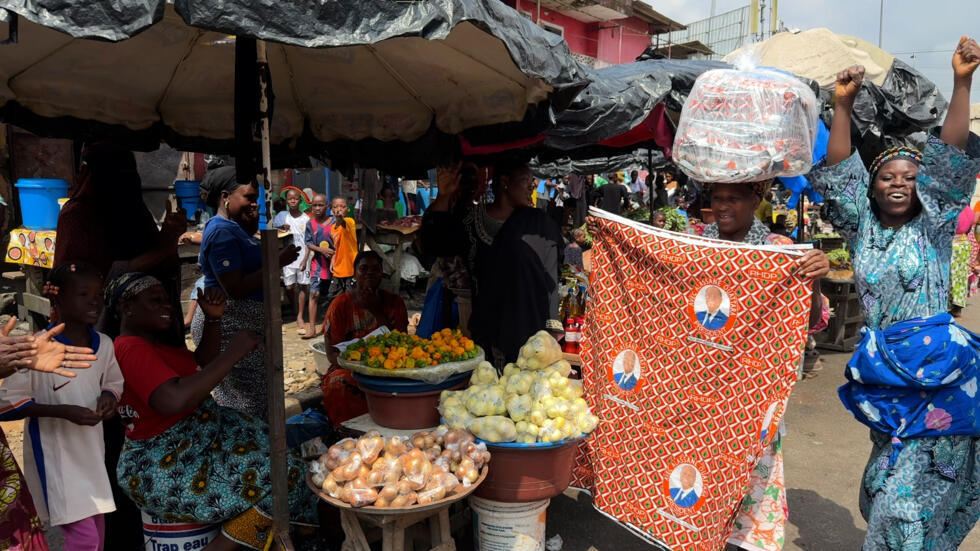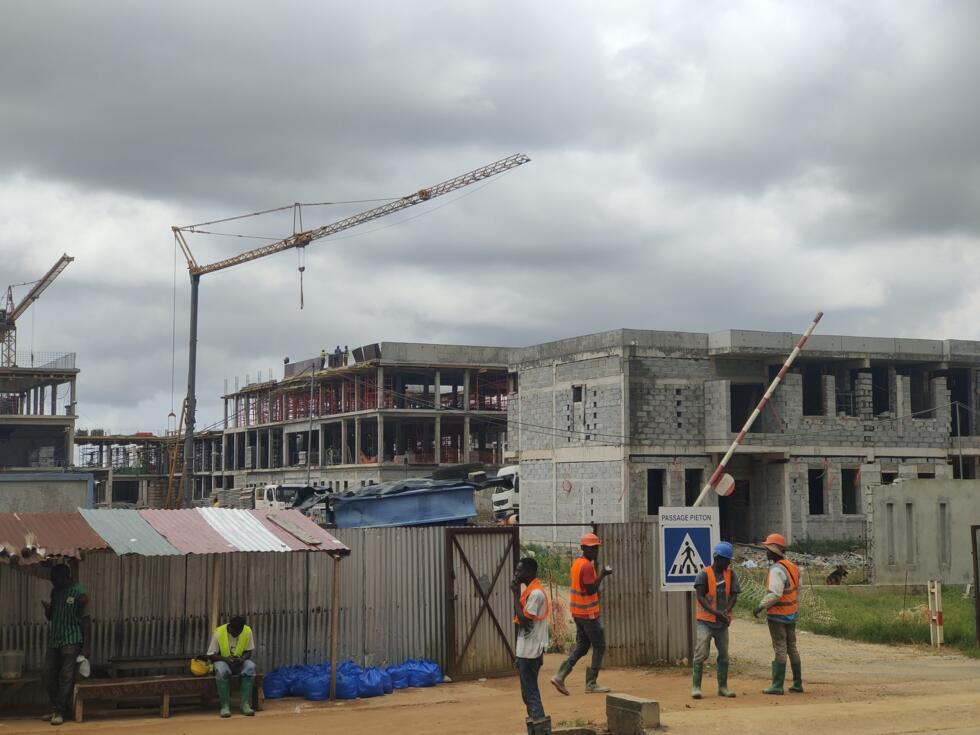

In President Alassane Ouattara’s stronghold of Abobo, a working-class commune in Abidjan’s north, the incumbent’s supporters are convinced that he will win Saturday’s presidential election in a first-round “knockout blow”. FRANCE 24 spoke to some of the president’s most ardent fans about what three terms of Ouattara have done for the neighbourhood.
In Abobo commune, a long-standing stronghold of Ivory Coast’s incumbent President Alassane Ouattara, the last days of the presidential campaign look more like a party.
Convinced that their candidate will win outright in the first round of the presidential vote on Saturday, the assembled activists heap praise on the “new face” of their neighbourhood. The commune’s come a long way, they say, since the deadly post-election violence of 2011.
In front of the town hall of Abobo, one of the 13 "communes" that make up the country’s largest city Abidjan, a sweeping plaza hosts grandstands and a stage bearing the president’s picture.
The atmosphere is festive – an eager child in a school uniform calls out to us. “I’m voting for ADO – who are you voting for?” On the other side of the square, a human tide draped in orange is pouring in, dancing to the sound of immense speakers.
Around them swirl a team of young Ivorians on roller skates.
“We’re the ADO Boys and Girls,” one of the activists, Leila Dosso, explains. “Young volunteers who mobilise across the country every campaign to support our candidate.”
Portraits of Ouattara adorn every street corner, and his name is on everyone’s lips. At the Siaka Koné market beside the plaza, the merest mention of Saturday’s vote sparks wild reactions.
“ADO my candidate!” “It’s Alassane or nothing!” cry the vendors, decked out in wraps, caps and T-shirts bearing the face of their “dear president”. Ouattara, who has led the country since 2011, is now campaigning to secure a fourth term in office.
‘Today’s Abobo’
In a city home to more than six million people, Abobo is one of the most heavily populated communes, and often considered one of its poorest. But the neighbourhood has undergone a drastic change these past few years.
“Today’s Abobo is not the Abobo of yesterday,” said Lamine Toure, the secretary-general of the youth wing of the ruling Rally of Houphouetists for Democracy and Peace (RHDP).
On Kennedy Street, where he grew up, the 30-something-year-old has braved the traffic to preach his president’s good works.
“Here it was practically all mud, you couldn’t get through,” he says. “Today, look, it’s all paved, and ambulances have easy access thanks to the road.”

In his Japanese four-wheeler, Toure and a handful of other activists are on a tour of all the major projects that have sprung up across Abobo under Ouattara’s watch: the recently inaugurated courthouse – the most modern in the country, authorities say – as well as the site of the future University Hospital Centre, a massive construction side sprawling across 18 hectares on the neighbourhood’s outskirts, destined to become one of the largest teaching hospitals in West Africa.
Toure said that these works “offer the population a better access to public services” as well as improving the neighbourhood’s image.
“All these construction sites and these power lines make it easier to access the neighbourhood, making it safer and giving young people work,” he said.
Almost nine out of 10 Ivorians depend on the country’s informal sector to get by, and a large part of the country’s youth struggle to find employment. It’s a reality that is only too clear in neighbourhoods like Abobo.
‘Man of peace’
“The improvements are there to see, but Alassane Ouattara’s programme is a step-by-step programme,” Toure said. “We’re trying to get this message through to young people so that they understand. We can’t forget that we’ve got a long way to go, because we were completely forgotten by the rest of the nation.”
A historic stronghold of Ouattara, Abobo is a deeply cosmopolitan neighbourhood. It is home to a large community of Ivorians from the country’s northern regions, where the current president has his roots.

Following the crisis that followed the 2011 presidential election, people here took up arms against Laurent Gbagbo’s militias during months of violence that left around 3,000 people dead.
Many Abobo residents lost loved ones in the fighting – including Toure, whose uncle was killed. Ouattara’s supporters in the neighbourhood champion Ouattara as a “man of peace” who has allowed the commune to turn the page on this dark chapter of their past.
‘Knockout blow’
If Ouattara’s face seems to be everywhere in Abobo, the odd poster promoting one of his rivals serves as a rare reminder that the outcome of Saturday’s election has yet to be decided.
Besides the incumbent, four candidates have been allowed to run by the Constitutional Council: former first lady Simone Ehivet, ex-ministers Ahoua Don Mello and Henriette Lagou as well as businessman and former trade minister Jean-Louis Billon.
The two main opposition candidates, Gbagbo and Tidjiane Thiam, have not been allowed to compete after being struck off the electoral roll – the first following a criminal conviction, and the second due to controversy over his nationality.
“We authorise the other candidates in Abobo, but not those who want to wreck everything,” Toure said, accusing Gbagbo, Thiam and their supporters of wanting to disrupt the running of the election.
Read moreIvory Coast’s former first lady Simone Ehivet eyes the presidency
The thwarted candidates’ parties – the Democratic Party and the African People’s Party – have called for daily marches, heedless of a ban on opposition demonstrations imposed by authorities during the campaign period. Thirty-two people have been imprisoned for having taken part in the banned protests.
In Abobo, the RHDP is firmly in its element, with supporters convinced that the president will win a “knockout blow” – that is, an outright victory in the election’s first round. But Ouattara’s supporters are quick to assure listeners that everyone is free to express their political opinions.
Despite this, a door-knocking campaign by ADO’s supporters showed that not everyone was feeling at ease in Abobo ahead of the vote.
“I’m not a voter,” one resident said. “I have my choice, but it’s mine alone.” He quickly cut the conversation short.
Karim, one of the neighbourhood’s residents, said that emotions often ran high in the commune when it came to politics.
“Here, people are very straightforward,” he said. “Some of them love Alassane Ouattara as though he were part of their family, and political discussions aren’t always easy. Those who don’t share this point of view prefer to be discreet.
“Personally, politics scares me, and I prefer not to vote,” he added. “But you have to give it to Alassane Ouattara – he made Abobo residents proud again. Our commune was marginalised and had a bad reputation. People didn’t want to live here. Today, it’s being reborn.”
This article has been translated from the original in French.